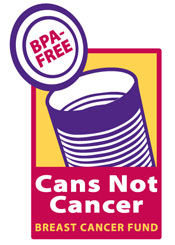Submitted by Rebekah Wilce on
 Succumbing to public pressure to eliminate the use of bisphenol A (BPA) (a suspected endocrine disruptor) found in baby bottles, plastic bottles and in the lining of food containers, Campbell's announced at a February shareholder meeting that it will begin to phase out the use of BPA in its soup can linings.
Succumbing to public pressure to eliminate the use of bisphenol A (BPA) (a suspected endocrine disruptor) found in baby bottles, plastic bottles and in the lining of food containers, Campbell's announced at a February shareholder meeting that it will begin to phase out the use of BPA in its soup can linings.
The phase out is a huge victory for groups such as the Breast Cancer Fund (BCF), Healthy Child Healthy World (HCHW), the Environmental Working Group (EWG), the Natural Resources Defense Council (NRDC), Center for Science in the Public Interest (CSPI) and Consumers Union that have been campaigning to limit the use of BPAs in the United States for many years.
In its 2008 report on "potential human reproductive and developmental effects of bisphenol A," the National Toxicology Program stated, "some concern for effects on the brain, behavior, and prostate gland in fetuses, infants, and children at current human exposures to bisphenol A."
Hard plastics in common items such as baby bottles, water bottles and the linings of cans and jar lids can leach BPA into infant formula, water and foods, especially when exposed to heat.
BPA use in baby bottles is banned in the European Union, Canada and some parts of the United States, such as Minnesota, Connecticut and recently California.
The Milwaukee Journal Sentinel published a series of articles on BPA in 2007 and 2008 called "Chemical Fallout" that won the National Journalism Award for public service and helped raise awareness in Wisconsin and nationally. Consumer Reports tested 24 brand-name canned foods for BPA in 2009 and found some level in all of them, up to levels that exceed the FDA recommended daily maximum in one serving.
Groups such as the EWG have called attention to BPA in baby bottles. The NRDC has called attention to BPA in water bottles, and in 2010 sued the U.S. Food and Drug Agency (FDA) for failing to regulate BPA. The FDA has until March 31, 2012 to make a decision on regulation.
A September 2011, BCF report on BPA in canned foods targeted at children found that Campbell's Disney Princess and Toy Story soups tested the highest. A follow-up report on BPA in canned foods commonly used in Thanksgiving meals found BPA in Campbell's canned turkey gravy and cream of mushroom soup.
 A public campaign by the BCF along with HCHF called "Cans Not Cancer" subsequently sent 70,000 letters to Campbell's.
A public campaign by the BCF along with HCHF called "Cans Not Cancer" subsequently sent 70,000 letters to Campbell's.
"Campbell's decision to move away from BPA is a victory for consumers, who have been demanding this change," said Gretchen Lee Salter, Policy Manager at BCF. "To truly be an industry leader, the company now needs to fully disclose the timeline for the phase-out and the alternatives that will be used."
The Campbell Soup Company is the world's largest soup maker, with sales of $7.7 billion in 2011. Campbell's Chief Financial Officer Craig Owens told CSPR that the shift to BPA-free cans has begun and is not expected to impose a "material" cost to the company.
The "Cans Not Cancer" campaign is working to get BPA out of all canned foods. More information on BPA is available from HCHF here. A form to join BCF's campaign is available here.

Comments
Rebekah Wilce replied on Permalink
BPA ban bill introduced in AZ